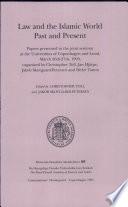Principles of Civil, Criminal, and International Law under the Shari‘a
“I highly recommend ‘Introduction to Islamic Law: Principles of Civil, Criminal, and International Law under the Shari‘a’ to scholars and any individual who desires to learn about the Shari‘a and its basic values through an objective, methodical study.” Mohamed A. ‘Arafa, Ph.D. Assistant and Adjunct Professor of Law Alexandria University Faculty of Law, Egypt Islamic law (Shari‘a) is an all-inclusive legal tradition that creates a seamless web reaching from the public sphere into the private sphere of life. Thus, the Shari‘a recognizes no bifurcation between legislation and religion, no wall of separation between the mosque and the state, and no compartmentalization of morality, faith, and law. Nonetheless, the duties under Islamic law can be divided into two large subcategories, the first and most important of which mainly concerns the private, individual relationship between God and man. In contrast, the second duty mainly concerns the public, transactional relationships among individuals which – in a secular framework – is most analogous to “law.” Introduction to Islamic Law begins with an overview of Islam as a whole, including a discussion of the sources of Islamic law and sectarian distinctions. Then, the book thoroughly addresses the secondary duties of Islamic law, which govern daily transactions between individuals, including the law of contracts, property, banking and finance, and familial relations as well as criminal law and procedure and the law of war. The legal rules embodied within the Shari‘a are mandatory in jurisdictions adhering to a strict application of Islamic law. However, Islamic law remains highly influential even in Muslim-majority countries with secular legal codes. Nevertheless, given recent developments in the Arab world, as well as the rise of terrorism in the name of Islam, the Shari‘a is a subject that has seeped into the national dialogue of wholly secular, non-Muslim jurisdictions. Thus, Introduction to Islamic Law is offered for scholars and students – both Muslim and non-Muslim, with or without a legal background – for the purpose of obtaining a basic understanding of the foundational concepts of the Shari‘a.
Then, the book thoroughly addresses the secondary duties of Islamic law, which govern daily transactions between individuals, including the law of contracts, property, banking and finance, and familial relations as well as criminal law and ...










